15FJFJ011 - French Literature of the 17th and 18th century
| Course specification | ||||
|---|---|---|---|---|
| Course title | French Literature of the 17th and 18th century | |||
| Acronym | 15FJFJ011 | |||
| Study programme | French Language and Literature with another Romance language and culture | |||
| Module | ||||
| Type of study | first degree undergraduate academic studies | |||
| Lecturer (for classes) | ||||
| Lecturer/Associate (for practice) | ||||
| Lecturer/Associate (for OTC) | ||||
| ESPB | 6.0 | Status | ||
| Condition | / | Oblik uslovljenosti | ||
| The goal | An overview of the main streams of French literature of the 17th and 18th centuries, as well as works of the most important writers. | |||
| The outcome | Adoption of literary-historical knowledge from the French literature of the seventeenth and the eighteenth centuries, raising the capacity for literary analysis and interpretation of literary works from the above-mentioned period. | |||
| Contents | ||||
| Contents of lectures | Malherbe and his disciples (Maynard, Racan). Baroque (Régnier, Théophile de Viau, Saint-Amant, Tristan l'Hermite). Préciosité (poetry: Voiture, novel: Honoré d'Urfé, Mlle de Scudéry): Burlesque (Cyrano de Bergerac). Libertinism. Jansenism (Pascal). Rationalism (Descartes). Doctrine of Classicism (Boileau). Theater: the period before Corneille; tragedy (P. Corneille, J. Racine); comedy (Moliere). Fables (La Fontaine). Novel (Mme de La Fayette). Moralists (La Rochefoucauld, La Bruyère). The crisis of the 18th century society. Development of scientific and critical thought (Fénelon, Fontenelle, Bayle). The concept of enlightenment. Classics of the 18th century. The quarrel of the Ancients and the Moderns. Memoirs (Saint-Simon). Encyclopedists. The development of the theater: The decline of the classical tragedy. Social and psychological comedy (Marivaux, Lesage, Beaumarchais); Didro and the theater. Philosophical thought and work (Montesquieu, Voltaire, Rousseau). Rousseauism (Bernardin de Saint-Pierre). Poetry (Chénier). Literature and the revolution. | |||
| Contents of exercises | Interpretation of the selected texts from the program. | |||
| Number of hours per week during the semester/trimester/year | ||||
| Lectures | Exercises | OTC | Study and Research | Other classes |
| 2 | 2 | |||
| Methods of teaching | Monologue, dialogue, presentations, discussions | |||
| Knowledge score (maximum points 100) | ||||
| Pre obligations | Points | Final exam | Points | |
| Activites during lectures | 10 | Test paper | ||
| Practical lessons | Oral examination | 70 | ||
| Projects | ||||
| Colloquia | 20 | |||
| Seminars | ||||

